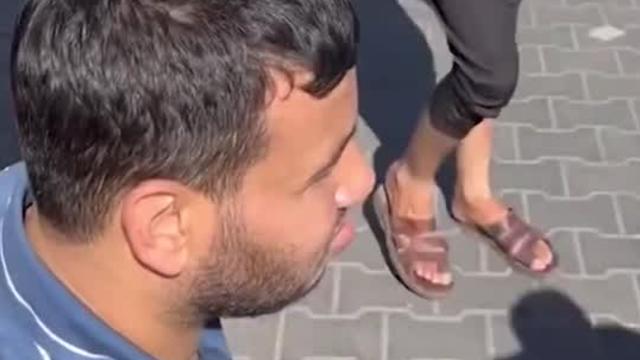Why can't people leave Gaza? Gaza Strip blockade explained amid Israel evacuation order.

The Israeli military called for the evacuation of Gaza City Friday ahead of an expected ground invasion against Hamas, which controls the territory. Israel’s order calls for people living in north Gaza to move south of the Wadi Gaza area, located in the middle of the Gaza strip. Hamas, which launched the deadly incursion into Israel on Oct. 7, told residents to remain in place.
The United Nations has called for Israel to rescind the order to avoid what it calls a “horrendous” humanitarian crisis. The order would effectively give more than 1 million Palestinians, many of them impoverished, a day to flee their homes. Israel says it’s ordered the evacuation to spare civilians ahead of a ground invasion?
“This will only lead to unprecedented levels of misery and further push people in Gaza into the abyss,” the United Nations Relief and Works Agency for Palestine Refugees in the Near East said in a statement Friday.
Live updates: Some flee northern Gaza after Israeli evacuation order
What is the Gaza Strip?
Gaza is central to the Israel-Hamas conflict. The 139-square-mile strip borders Israeli territory on its northeastern and southeastern sides and Egypt to its southwest. The Mediterranean Sea is to the west. It is one of two Palestinian territories and home to at least 2.23 million people.
To understand more about the long history of the Israeli-Palestinian conflict, read our full explainer.
Hamas -- a Palestinian Islamist political and military organization -- has controlled Gaza since 2007. After winning the 2006 parliamentary elections in the region, Hamas seized control from the Palestinian Authority, a governing body that oversees parts of the Israeli-occupied West Bank.
Hamas staged a brutal surprise attack on Israel nearly a week ago and has fired thousands of rockets since. Israel has responded with a heavy aerial bombardment and has sealed off the Gaza Strip, stopping all entry of food, water, medicine and fuel. At least 2,800 people have died on both sides.
Why can't people leave Gaza?
The U.N. says the mass evacuation orders will affect more than a million people. A total evacuation would mean the entire 2.23 million population of Gaza would have to squeeze into the southern half of the strip. Gaza, which is only 25 miles long in its entirety and just over twice the size of Washington, D.C., is the 63rd-most densely inhabited urban region in the world.
Many are also voicing uncertainty about safety anywhere in the strip if they leave their homes.
Gaza is surrounded by blockades imposed by Israel and Egypt, which restrict movement. Israel prevents access to and from Gaza by sea and air. Land movement is restricted to three crossings: the Egypt-controlled Rafah crossing and Erez and Kerem Shalom crossings, which Israel controls.
The Israel-Gaza perimeter consists of barbed wire fences, underground concrete walls to prevent tunneling and a 325-foot no-go and high-risk zone. You can view USA TODAY’s illustration of this area here.
Hamas operates a network of tunnels, which it has used to smuggle in goods and weapons and to launch attacks into Israel. Israeli Defense Forces indicated the tunnels, some beneath homes, sheltered militants and would be a focus of their offensive. They urged Gazans to flee.
What role does Egypt, which borders Gaza, play?
There are just two ways to leave Gaza: through Israel, and through Egypt, which is strongly opposed to allowing people from Gaza to cross into its territory. Egypt fears being drawn deeper into the crisis. Gazans "must stay steadfast and remain on their land," Egypt's president Abdel Fattah el-Sisi said this week.
Egypt’s Rafah crossing is the main exit point from Gaza not under Israeli control, but it’s been closed since Tuesday after being hit by Israeli strikes. Egypt is discussing plans with the U.S. to provide humanitarian aid through the border but will not take in refugees fleeing the strip, Al Jazeera reports.
Egyptian officials have historically encouraged Palestinians to remain in Gaza, in part because accepting refugees could widen the conflict.
According to the U.N. humanitarian office, more than 400,000 people have fled their homes in the Gaza Strip. Even before the October conflict began, about 81% of the Gaza population was living in poverty and 63% of Gaza residents were food insecure.
The U.S. government has been able to help U.S. citizens to leave parts of Israel, but Gaza departures remain difficult.
Why is Gaza under blockade?
The 16-year-old blockade began after Hamas seized control of the Gaza Strip.
Israel says its economic and physical blockade is necessary to isolate Hamas. Backed by Egypt, the Israeli government has restricted the import of goods they say could be used for weaponry and blocked many Palestinians from leaving Gaza. The result has been a starved economy, astronomically high unemployment, and a buckling hospital system.
“Israel, with Egypt’s help, has turned Gaza into an open-air prison,” Omar Shakir, the Israel and Palestine director at the non-government organization Human Rights Watch has said.
Egypt’s participation in the blockade – and subsequent border closing – stems in part from a fear that the conflict will spill outside of Israel.
“Egypt will not allow the Palestinian cause to be settled at the expense of other parties,” Egypt’s President Abdel Fattah el-Sisi said Tuesday, according to The New York Times.
Israel-Hamas War newsletter: Get the latest news and analysis on the conflict in your inbox
Where do Gaza refugees go?
Right now, many displaced Gazans are taking shelter in U.N. schools. There are eight refugee camps in the Gaza Strip with some of the highest population densities in the world, the U.N. states.
American officials, including Secretary of State Antony Blinken, are turning up the pressure on Egypt to allow Gazans to leave through Egypt’s Rafah crossing point.
Contributing: Anna Kaufman, Thao Nguyen, Trevor Hughes, Jeanine Santucci, Josh Meyer, Tom Vanden Brook
This article originally appeared on USA TODAY: Why can't people leave Gaza? Blockade in Israel-Hamas war explained.